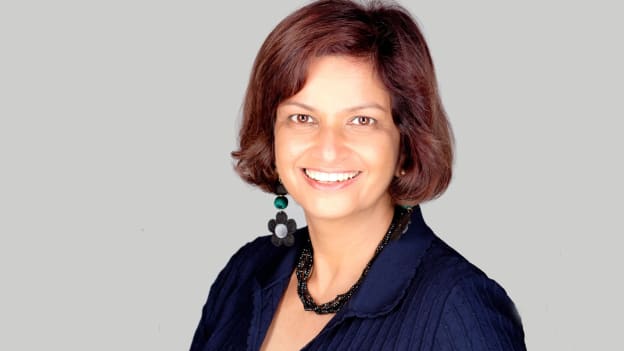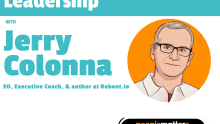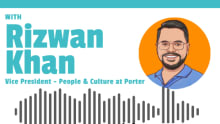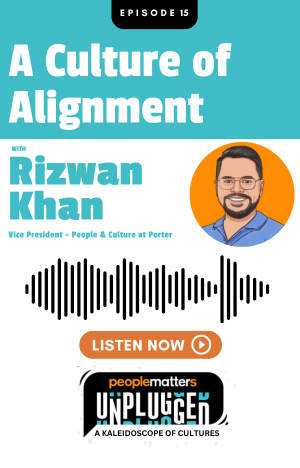The ROI in DEI is multifold: MD & CHRO APAC, Societe Generale

Mukta Arya, ACC, is the Managing Director, Chief Human Resources Officer, APAC at Societe Generale.
Mukta is a Human Resources Professional with 24+ years of experience in multiple industries and locations in APAC. Starting her career with Essar group in Mumbai, India, after completing Masters in Management Studies, she worked in Tata TD Waterhouse Securities/Tata TDW Asset Management, before joining Ogilvy and Mather as Talent Head for Mumbai, Advertising.
In 2006, Mukta joined Societe Generale in Mumbai as Head of HR for India and has been with them for the last 16+ years. She worked in Hong Kong as Regional Head of Talent Development and Inclusion since 2010 and as Head of HR for SEA for Societe Generale in Singapore for 4 years, before being appointed as the CHRO for Societe Generale, APAC, now based in Hong Kong.
Mukta is a Certified Coach (ACC) accredited by the International Coaching Federation. She is also a Global Fellow in Talent Management by Wharton University and a Global Talent Management Leader with certification in Diversity and Inclusion, MBTI, FIRO B, Experiential Learning, HR Audit, Competency Mapping and Leadership Development.
She is a published author with 4 books till now - Wanton Thoughts, 3:15 PM- Musings in Hong Kong, Whimsical Times and Criss Cross- A Medley of Thoughts.
In this exclusive interview, Mukta talks about embedding DEI elements in talent management processes, enhancing accessibility inclusion for differently-abled talent, best practices to build a thriving ecosystem for LGBTQ+ talent, and crafting transformative learning experiences for sustainable change.
Here are excerpts of the interview.
What are Societe Générale’s top three DEI priorities for 2022?
In Societe Generale, APAC, we have four main DEI focus areas- Gender, Cultural, Differently Abled and LGBT+, which were identified by us. With a D&I steering committee at regional level in 2015, we started with creating networks with employee volunteers and creating awareness on these topics internally in the organisation. Over the years we have progressed to embedding DEI elements on the above in our HR policies and managerial practices.
On gender, we have been working on gender balance in our organisation, which is not an easy task in corporate and investment banking at senior levels, given the systemic issue.
The added complexity is that gender ratios are not the same in all countries that we operate in Asia, so we need to have a customised approach in different countries.
On cultural diversity, we are looking at creating an inclusive environment with a mix of nationalities in our organisation. In APAC, we have around 30 different nationalities at all levels of the organisation. The challenge that we are aiming to overcome is the perception of employees as well as concentration of few nationalities for senior positions.
On Differently Abled, the challenge is to create awareness among employees on visible and invisible abilities in the workforce and implement accessible and inclusive measures. We have already started on this front and we hope to see much more progress in the near future.
On LGBT+, we are in the process of enhancing an inclusive environment with awareness about the issues that LGBT+ employees may face based on conscious and unconscious bias and progressive policies.
Every year, we review our priorities and look at current challenges being faced in countries in APAC. We believe with consistent efforts, policies to support families, development programmes for specific groups of employees, conscious effort to embed DEI criteria in talent management process from recruitment, succession planning to development, open culture of “speaking up” and acting on employee suggestions, we have managed to build an inclusive environment for our employees and will continue to make progress.
With the pace of change still slow, how can organisations better balance the needs of underrepresented communities across access to employment, mental healthcare, career growth and cultural inclusion?
I would not differentiate the integrated talent management approach for different communities of employees. However, within the approach, it is important that for an organisation, if there’s an issue of underrepresentation, the elements of access to employment, mental healthcare, career growth and cultural inclusion should be embedded in day-to-day HR policies. If they are not part of the policy and if HR and managers are not trained for those elements, it can fall through the cracks. I am a believer in institutionalising the actions in organisation, so that they are not person dependent. In my opinion, all the elements are equally important and they should not be compromised.
A recent Harvard Business School report coined the term 'hidden workers' to reflect the missing talent pool in global hiring efforts. In your opinion, what is keeping underrepresented talent hidden despite the spotlight on DEI today?
I believe several companies have started or are making efforts in accessing the hidden talent pool that is relevant to them, but to be frank, most of the organisations are still at the early stages, e.g., a pilot initiative with limited scale.
Given the small scale, it might not be very easy to see the business value of the initiatives in the short run as these will require time to be visible. Having said so, I think we are still on the right track and with consistency and perseverance, we will be able to “see the hidden gems” in future.
With technology underpinning workplace accessibility for differently abled talent, how do you foresee inclusion becoming a reality? How is Societe Generale enabling its workforce and the broader community to overcome the social model of disability?
Technology is a big support for our initiatives regarding differently abled employees. Accessibility for movement with automatic doors to features in Microsoft Teams related to Live captions during meetings or “Reading” function in Outlook, all helps to create an inclusive environment for differently abled people.
IT infrastructure which allows us to work from home is a boon for corporates to explore different working arrangements which are favourable to employees with different needs.
In Societe Generale, we have made conscious efforts to create awareness on the topic of Visible and invisible disabilities through our Employee Resource Group - Differently Abled Network (DAN). DAN organises webinars, panel discussions, participating in external events like Runathon organised by an NGO-CareR in HK, throughout the year and engages employees to know more about the topic. We have also made conscious efforts in our office design in locations (wherever possible) to improve accessibility. Some locations took the lead in hiring of Differently abled interns to test whether we can integrate them well and whether we can hire more employees with these abilities in full time positions in future. The network has also worked with HR on mental health care initiatives e.g. Mental health first-aid, caregivers support group, well-being month, with over 20 activities across 12 locations in APAC etc.
What are some essentials to shaping meaningful and transformative learning experiences for the distributed workforce and bringing sustainable mindset and cultural change?
The first few things coming to my mind are the debrief and collective experience. With the advancement of technology, there are various means or modes of remote learning where users could complete the learning completely on their own. However, I believe the real difference lies in whether users could be accompanied in reflecting on the concepts and knowledge they learnt and what’s next for them.
Discussion with peers and a hybrid mode of training with some instructor-led elements would be very conducive to make the learning more impactful.
Panel discussions and hearing from people who have experienced the concepts are also a powerful way of learning. In our sessions, we have a mix of these components so that it reaches employees with different learning styles in the most effective way.
In recent years, Societe Generale has done tremendous work towards making their organisation a workplace where LGBTQ+ talent can thrive. Can you share some of these practices and their impact?
As mentioned above, we aim to create an inclusive environment for LGBT+ employees. We have worked on several initiatives in this field through our ERG which is quite active in creating awareness across the organisation through training sessions throughout the year but also an annual LGBT+ week, participation in external panel discussions and webinars, movie screenings on the topic, career fairs as well events like Pink Dot and celebration of Pink Friday.
Our LGBT+ ERG launched “Reverse Mentoring” on the topic for all the 20 Management Committee members in APAC. I was also a mentee and even though I have a fair level of exposure to the topic, I learnt a lot.
It was eye opening to me and to my fellow management committee members to understand the real issues faced by the community and how we can play a part towards enhancing LGBT+ inclusivity in the organisation.
In addition, we have embedded benefits for LGBT+ employees in our policies and have started revising our internal policies with gender neutral language. We have been recognised for our efforts in this field with Gold awards by internal commitment awards for the ERG volunteers and by external organisations in Hong Kong and Japan in the past few years.
What is your advice for businesses struggling to achieve their diversity goals and unable to build the much-intended inclusive workplaces?
DEI is not a buzzword anymore.
DEI is a relatively long-term cultural change for workplaces, and it takes much more than the management to make everything happen.
For example, to foster such cultural change in broader teams, there must be solid awareness in staff at all levels in the organisation and managers should be able to explain on how the goals on DEI could be translated at team level.
Without company-wide participation and buy-in of the philosophy of DEI, it will be very difficult to “walk the talk” in the organisation. My advice will be to have the top management buy-in first and then choose “influencers” within the organisation to work on the initiatives and implement them. Recognition of the “influencers” and employee volunteers is extremely important and the organisation should earmark a budget for these initiatives. DEI is an area where, I believe the ROI is multifold in terms of employee productivity and retention.













